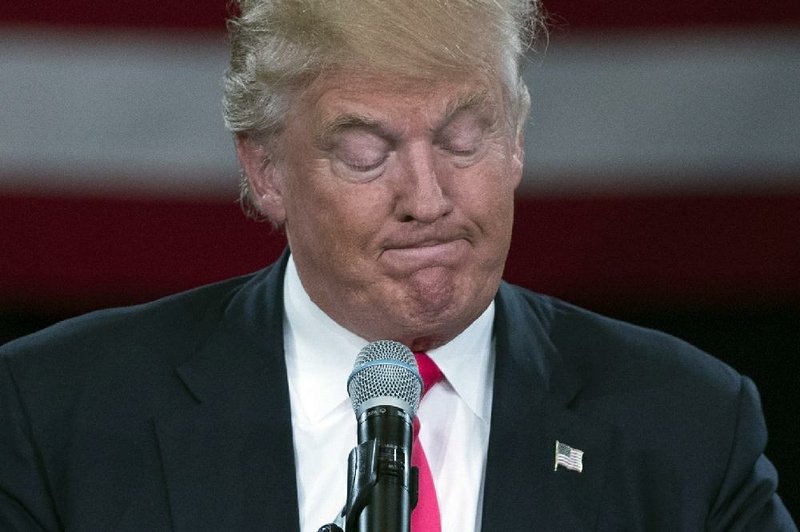PHILADELPHIA -- First came the hack, then the leak. Now, Hillary Clinton and Donald Trump's campaigns are fighting over Russia's role in the release of thousands of internal Democratic National Committee emails.
FULL ELECTION COVERAGE
RELATED ARTICLES
http://www.arkansas…">Clinton the one, Sanders tells backershttp://www.arkansas…">Arkansans exult in Sanders' campaign run
http://www.arkansas…">Arkansas Democrats stirred by fears of Trump victory
The email uproar is inflaming the rift between supporters of Clinton and primary rival Sen. Bernie Sanders of Vermont just when the Democratic Party was hoping to close it.
As the Philadelphia convention got underway Monday, developments in the email story rolled out in rapid sequence:
Clinton's campaign, citing a cybersecurity firm hired to investigate the leak, blamed Russia for hacking the party's computers and suggested the goal was to benefit Donald Trump's campaign.
Trump dismissed that idea as laughable, tweeting: "The new joke in town is that Russia leaked the disastrous DNC e-mails."
Addressing backers in Roanoke, Va., Trump accused Clinton of disloyalty for not protecting outgoing Democratic National Committee Chairman Debbie Wasserman Schultz after the release of the emails.
Trump claimed Wasserman Schultz "worked very hard to rig the system" in Clinton's favor, and that Clinton responded by throwing her "under the bus."
He also suggested at one point that China may have been involved in the DNC hack, despite no evidence to suggest the country's involvement.
"Little did she know that China, Russia -- one of our many, many friends -- came in and hacked the hell out of us," Trump said sarcastically, framing the word "friends" in air quotes.
The FBI announced Monday that it was investigating how the hack occurred, saying "a compromise of this nature is something we take very seriously."
Democrats have known about the hack since April, when party officials discovered malicious software on their computers.
They called in a cybersecurity firm, CrowdStrike, which found traces of at least two sophisticated hacking groups on the Democrats' network, both with ties to the Russian government.
Those hacks had access to at least a year's worth of chats, emails and research on Trump, according to a person knowledgeable about the breach who wasn't authorized to discuss it publicly.
The party publicly acknowledged the hack in June.
On Friday, the public got its first look at DNC emails when Wikileaks posted a cache of 19,000 internal communications, including some that suggested party officials had favored Clinton over Sanders during the primaries.
It wasn't immediately clear how WikiLeaks got the emails -- and WikiLeaks founder Julian Assange told Democracy Now he'd never tell.
Clinton's campaign didn't hesitate to make the connection with the Russians, with campaign manager Robby Mook saying cyber experts believed "Russian state actors were feeding the email to hackers for the purpose of helping Donald Trump."
Trump's team went out of its way to dismiss the alleged Russian connection as outlandish. Trump senior policy adviser Paul Manafort called the Clinton campaign statements "pretty desperate" and "pretty absurd."
Whatever the source, the fallout from the leaked emails was swift.
Wasserman Schultz resigned over the weekend after Sanders' campaign pounced on a number of leaked emails that they said showed that party officials had favored Clinton during the primaries.
The disclosure set off devoted Sanders supporters, who were already having a hard time moving past the bitter primary battles to embrace Clinton as the nominee.
Sanders told his delegates Monday that Wasserman Schultz's departure would "open the doors of the party to people who want real change." But even after Sanders urged his supporters to back Clinton, some were flashing thumbs-down signals and waving signs that said, "not Hillary, not Trump."
The email controversy raised new questions about Trump's foreign policy views with regard to Russia.
Clinton campaign Chairman John Podesta suggested there was "a kind of bromance going on" between Russian President Vladimir Putin and Trump. Or "maybe it's simply just a mutual admiration society," he told MSNBC.
The Clinton campaign says Russia favors Trump's views, especially on NATO. Trump himself has spoken favorably about Putin as someone he could negotiate with.
Trump supporters did succeed in preventing a reference to arming Ukraine from getting into this year's Republican platform, but the document is far from pro-Russia. It accuses the Kremlin of eroding the "personal liberty and fundamental rights" of the Russian people.
Clinton loyalists were eager to put a period on the latest email episode. Virginia Gov. Terry McAuliffe, a former chairman of the Democratic Party, said Monday "we're done" with the controversy. But Sanders' delegates didn't seem ready to move on. And there may be more fallout: Director of National Intelligence James Clapper has said U.S. officials expect more cyber threats against the campaigns.
Information for this article was contributed by Eric Tucker, Jack Gillum and Jill Colvin of The Associated Press.
A Section on 07/26/2016
